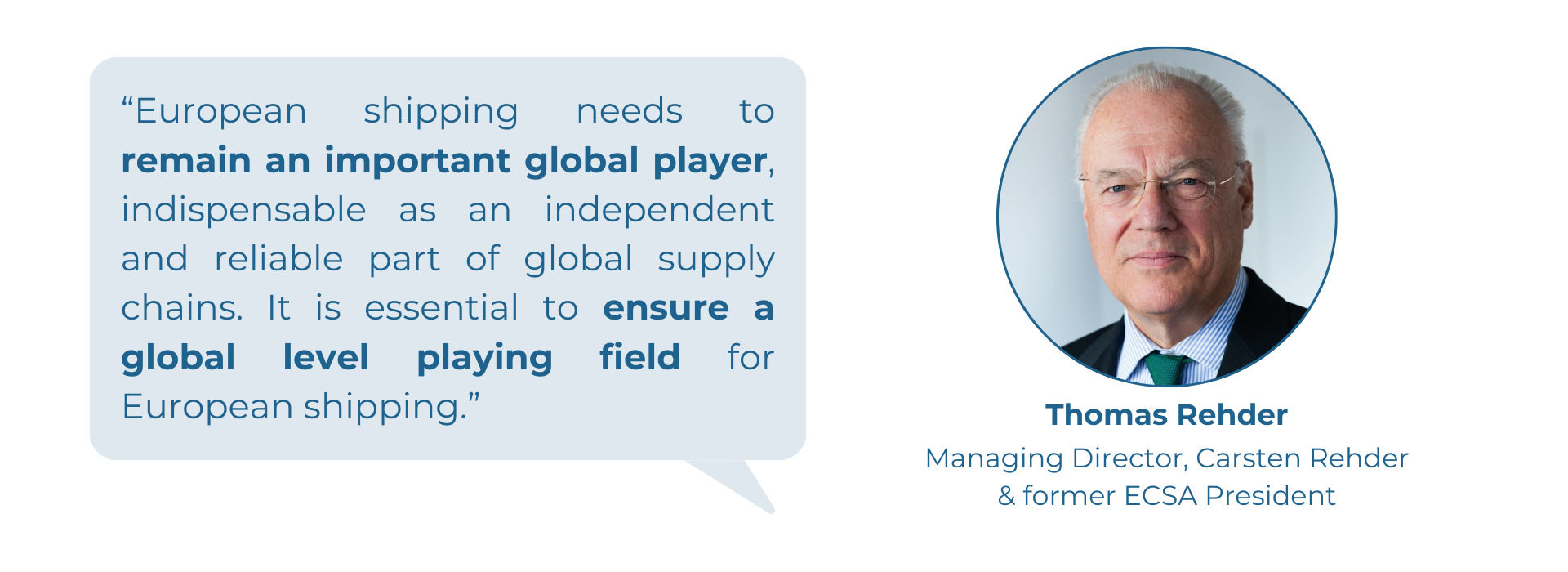Shipping People – Meet the European Shipowners
ECSA is launching our new interview series #ShippingPeople – meet the European Shipowners. Every month, we will be bringing the perspectives of central figures in the European shipping industry on the biggest topics in shipping.
Meet Thomas Rehder, Managing Director of Carsten Rehder, former ECSA President and current member of the ECSA Board. Mr. Rehder has more than 50 years of experience in shipping, many of which with the family company Carsten Rehder that he joined in 1984. In addition to serving on the ECSA Board he also holds a position as member of the council of German Shipowners Association.

Considering Europe’s goal to meet climate neutrality by 2050, which are the main challenges for shipping?
The main challenge is the availability of sufficient quantities of decarbonised fuels and this is first and foremost a challenge to the fuel producers. Currently, biofuels are the best available solution to ensure we can comply with FuelEU requirements.
Methanol is widely seen as an alternative, but must be green to be a real solution. Ammonia is CO2 neutral, but toxic makes it challenging to implement on a large scale. Wind power, battery solutions or fuel cells are all considered as complementing components.
Due to the differing specific characteristics of trades and ships, there will not be one solution that fits all purposes.
A short sea coastal voyage is different from long haul trades, a large container vessel on a fixed route needs a different solution than a small sized bulker engaged in tramp shipping worldwide. As a consequence, we need different solutions, both in terms of fuels and propulsion technologies, specifically geared to individual trading patterns.
We shall therefore see a wider variety of ship designs at the expenses of a reduced liquidity of 2nd hand markets in the future.
In light of the increasing digitalisation within the maritime sector, how do you anticipate these advancements will affect the role of seafarers onboard?
Digitalisation will mean even closer links between ship and shore, a real-time collaboration between crews, ship operators and ship managers. Ever closer monitoring will enhance the quality and punctuality of transport services, further reduce accidents and damages and help avoid unnecessary costs.
At the same time, it will mean that the role and responsibility of crews will change. Some routine work and standard maintenance will be supported by automated systems, with the aim first and foremost to reduce the administrative burden for seafarers. . However, as the installed equipment and electronic monitoring tools become more sophisticated, the use and maintenance of such equipment will require different skills and in many cases higher qualifications.
The professional profile of seafarers will become more demanding, requiring continuous training and upskilling.
The European shipping fleet is one of the largest in the world, enabling the EU to play a leading role in the global supply chains. How do you perceive the strategic role of shipping for European security?
As a consequence of the Ukraine war and of the Houthis’i attacks on merchant shipping in the Red Sea, we have learned the hard way that we cannot blindly rely on the seamless functioning of global supply chains. For our clients and cargo owners, this means a diversification of source markets and more selective and responsible sourcing of supplies and. Shipping will follow and adapt to new trading patterns. In this fast-changing geopolitical reality, maintain and enhancing the competitiveness of European shipping is more important than ever – controlling shipping means ensuring that our supply chain remains reliable and secure.
European shipping needs to remain an important global player, indispensable as an independent and reliable part of global supply chains. In order to maintain this vital role, it is essential to ensure a global level playing field for European shipping, to ensure we can remain competitive while we strive to meet the objectives of the energy transition and the ambitious EU climate targets.
For press and media enquiries, please contact:
Luisa Puccio, luisa.puccio@ecsa.eu, +32 492 733623

